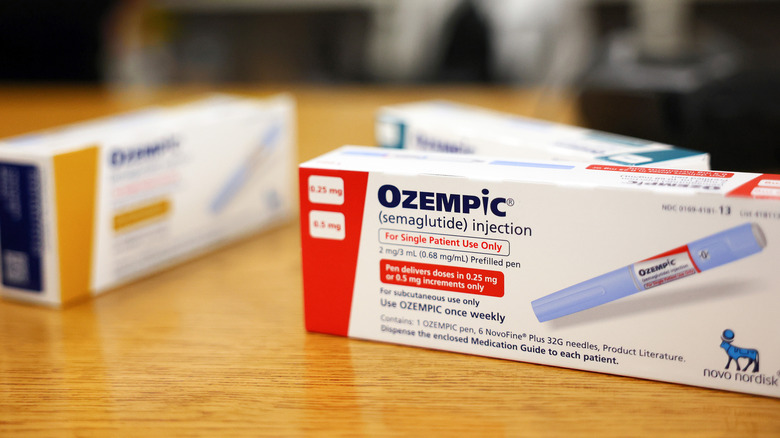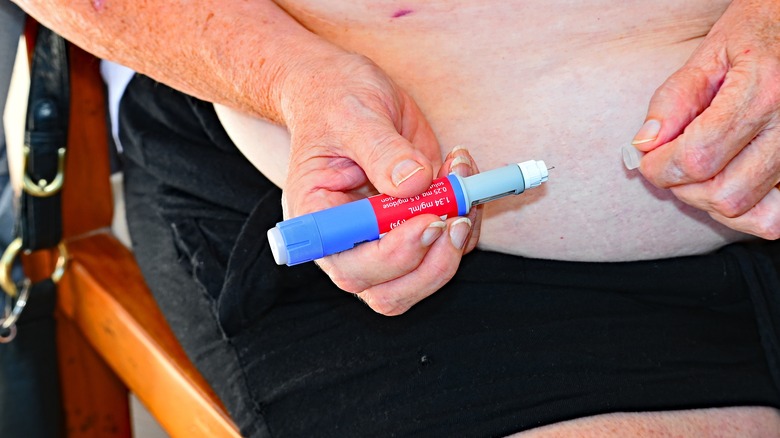Here's What Happens To Your Body When You Stop Taking Ozempic For Weight Loss
Seven out of 10 people in the U.S. are overweight, many carrying belly fat that is difficult to shed. No wonder so many people seem to be talking about Ozempic, an injectable drug approved by the FDA for treating type 2 diabetes. Many diabetics who have used this drug discover that it melts away fat. In fact, its manufacturer, Novo Nordisk, used a higher dose of the same generic medication, semaglutide, to create Wegovy, a weight loss medicine.
Ozempic is not FDA-approved for weight loss, yet some doctors have been prescribing it, off-label, for weight loss. This has led to shortages of the drug, a potential problem for those who need it. This leads many to wonder about the drug's effects, in particular: What happens when you stop taking Ozempic?
It's important to first understand how this medicine works. Semaglutide boosts a natural hormone in your body called glucagon-like peptide 1 (GLP-1), which is usually released about 10 to 15 minutes after we eat. GLP-1 stimulates the release of insulin, which helps turn food into glucose, the energy source for your body's cells, and it also helps your body maintain a consistent amount of glucose in your blood for a steady energy flow. This digestive hormone, which is mainly manufactured in your gut, also slows the emptying of the stomach, while activating areas of the brain that suppress appetite, according to UCLA Health. And this leads to a cascade of consequences.
Taking the drug
The results are significant, according to a medical study published in the prestigious New England Journal of Medicine. "Approximately 70% of participants [taking semaglutide] achieved a weight loss of at least 10%, and approximately 50% achieved a weight loss of at least 15%. Furthermore, one-third of participants treated with semaglutide lost at least 20% of baseline weight," wrote the authors. Of course, like any drug, there were side effects, most related to digestion, according to the scientists. Reddit posts describe physical reactions to semaglutide more plainly. For example, one Reddit user reported "non stop projectile vomiting and diarrhea. Burping uncontrollably."
Other effects also take "skinny pen" users by surprise. For example, some people acquire "Ozempic face," the hollowed-out look caused by rapid weight reduction that can lead to the loss of too much facial fat. Others experience a change in their relationship with alcohol. Reddit users reported no longer craving alcohol, not feeling buzzed or drunk, suffering nausea after drinking very little, and waking up with terrible hangovers.
Meanwhile, strange dreams were an unanticipated Ozempic side effect for some. One Reddit thread describes cinematic nightmares, including "being held hostage and killing my cats." Either the drug-stimulated hormone activates additional brain regions (not just the appetite center) or it simply causes users to wake more frequently and so they remember otherwise forgettable dreams, theorized Dr. Caroline Apovian, a professor of medicine, and Deirdre Leigh Barrett, a dream researcher, in the pages of the Wall Street Journal (via Becker's Hospital Review).
Stopping Ozempic
So it's been months of Ozempic shots and you're at your goal weight. Still, the cost of using this drug, which can top $15,000 a year when insurance doesn't cover it, is overwhelming. How will your body react if you stop?
Tapering is not recommended and ending the weekly injections will not cause withdrawal symptoms. Any negative effects you've been experiencing will end almost as suddenly as they began. Still, Dr. Cecilia Low Wang, endocrinologist, delivers the bad news on the University of Colorado Health blog: "Whatever you were treating is likely to recur." The New York Times reports a sudden stop can cause a sudden rise in a patient's glucose levels. In turn, patients with diabetes may suffer "blurry vision, fatigue and excessive thirst and urination ... [and] become more susceptible to yeast or other fungal infections, which are linked to higher blood sugar." Stopping Ozempic also means your appetite will undoubtedly return and you'll almost certainly regain some weight. The journal Diabetes, Obesity and Metabolism reports that volunteers who took semaglutide for 68 weeks and then went off it for a year regained two-thirds of the pounds they'd shed. Yet, there is a slender silver lining; whether participants experienced a blood sugar surge or not, their glucose and cholesterol levels one year later showed a small improvement compared to the start of the experiment.
Ozempic may be imperfect, but it might also help some patients achieve better health. Talk to your doctor to understand whether this is an option for you.


